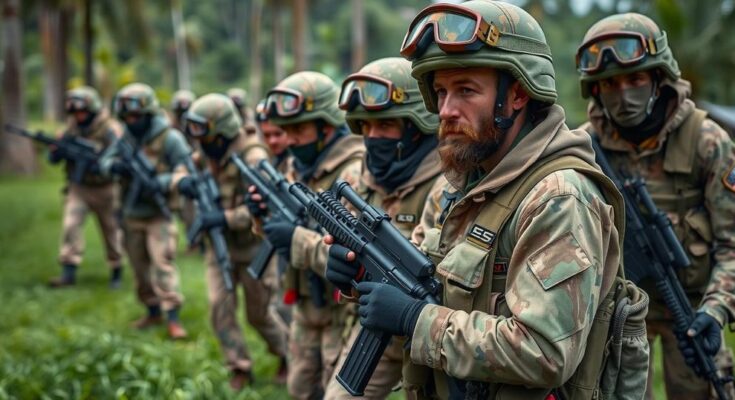The Democratic Republic of Congo is receiving assistance from foreign military contractors, including retired French Colonel Romuald leading Agemira, to combat the M23 rebel group. The situation remains complex, with accusations of Rwandan support for M23 and ongoing diplomatic challenges. Despite their defensive role, achieving peace is still a distant goal amid technical and logistical hurdles.
The Democratic Republic of Congo (DRC) is currently receiving assistance from foreign fighters in its ongoing struggle against the M23 rebel group. Notably, Colonel Romuald, a retired French paratrooper, leads a Bulgarian security firm named Agemira, which not only provides advisory support to Congolese forces but also manages assets such as aircraft and drones, and oversees arms transactions. Another military contractor, RALF, consists of veterans predominantly from the French Foreign Legion, deployed to safeguard the pivotal city of Goma and the town of Sake. Despite these foreign contributions, the insurgency continues, exacerbated by allegations regarding Rwanda’s backing of the M23 group and its illicit exploitation of DRC’s rich mineral resources. Additionally, challenges including M23’s technical advantages and sporadic compensation for foreign personnel further complicate the situation. Unlike other mercenary organizations, both Agemira and RALF emphasize advisory and defensive roles, thereby distancing themselves from potential human rights allegations. However, the quest for peace remains hampered by a lack of effective diplomatic resolutions.
The M23 insurgency has its roots in complex regional dynamics, particularly involving the DRC and its neighbor, Rwanda. The group has been accused of receiving support from Rwanda, prompting significant military responses from the DRC. Hired foreign fighters like Colonel Romuald from Agemira and RALF aim to enhance Congolese military capabilities against the rebels, reflecting a broader trend of privatization of military skills in conflict zones. These private military companies, while fulfilling roles that may include combat support, advocate for a more restrained engagement to avoid the pitfalls associated with mercenary work, especially regarding human rights issues.
In summary, the Democratic Republic of Congo’s reliance on foreign fighters to combat the M23 rebel group illustrates the complexities of modern warfare and the interwoven challenges of regional politics and military strategy. While contributions from firms like Agemira and RALF provide critical support, the enduring nature of the conflict, compounded by external influences and logistical difficulties, underscores the ongoing struggle for stability in the region.
Original Source: www.africa.com




